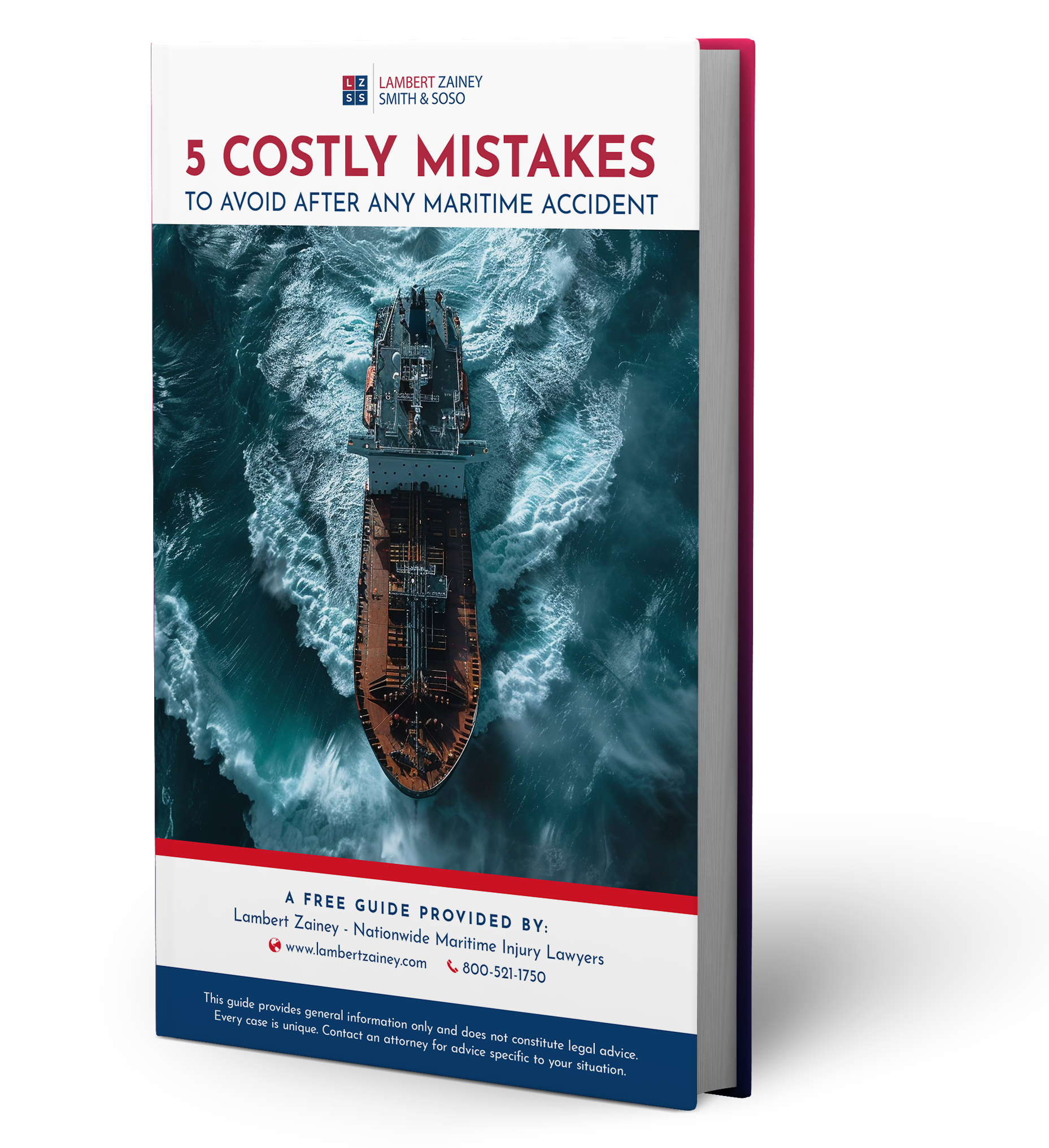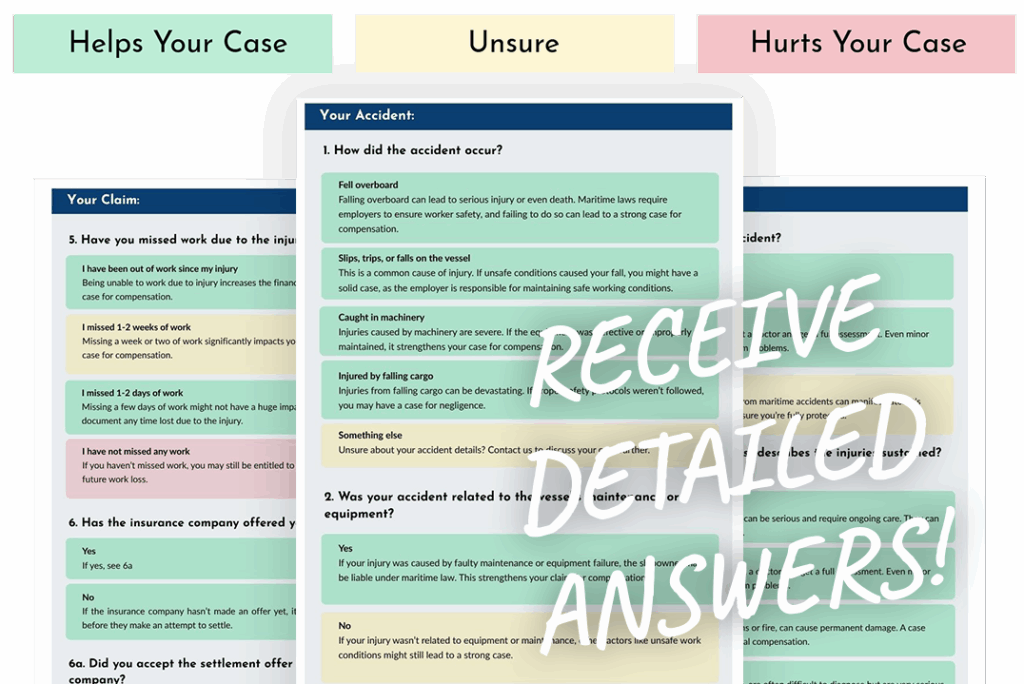Burn injuries are among the most common — and serious — maritime accidents. These types of injuries can result in permanent disfigurement, disability and even death.
Common causes of maritime burn injuries include:

Types of Maritime Burn Injuries
Burn injuries are distinguished by severe skin damage that causes the affected skin cells to die.
Burn injuries are classified in three broad categories, based on their severity:
First-degree burns. Only the epidermis (outer layer of skin) is affected. Symptoms are temporary and include redness of the skin, minor pain, swelling, and tenderness.
Second-degree burns. Also known as partial thickness burns. These are a little more serious, affecting the epidermis and dermis (lower layer of skin) and can take longer to heal than first-degree burns.
Third-degree burns. Also known as full thickness burns, penetrate through the dermis, affecting deeper tissues. These types of burns can be very painful and result in scarring.
Symptoms of Maritime Burn Injuries
Symptoms of marine burn injuries depend on the type and cause of burn, and can include:
Minor first- and second-degree burns respond well to first aid treatment. They usually resolve themselves with little or no complications. However, the same isn’t true for severe second- or third-degree burns.
Potentially life-threatening complications that can result from third-degree burns include:
Maritime workers with severe burn injuries may require:
Steps Employers Should Take to Prevent Burns
Proper safety training and equipment is essential to preventing maritime burn injuries. Some of the ways maritime employers can help prevent the causes of these injuries include:
Get Our FREE Guide to Protect Your Claim
What you do after an accident is critical. Insurance companies will try to get you to make mistakes that can hurt your claim. Our free guide can help you avoid these traps.
Download our complimentary guide: “5 Costly Mistakes to Avoid After Any Maritime Accident” to arm yourself with the knowledge you need to protect your rights.
Get the Compensation You Deserve For Your Maritime Burn Injuries
Have you suffered burns as a result of a maritime accident caused by employer negligence? The Jones Act and other maritime laws give you the right to seek compensation for your injuries. This includes maintenance and cure benefits.
Lambert Zainey has been protecting the rights of injured maritime workers since the 1970s. We have an proven success record when it comes to representing maritime workers with burn injuries, including multi-million dollar settlements for the workers killed or injured in the 1990 Arco pipeline explosion.
You only have a limited time in which to take action. Contact Lambert Zainey to speak with an experienced maritime injury attorney about your claim.
Burn injuries are among the most common — and serious — maritime accidents. These types of injuries can result in permanent disfigurement, disability and even death.
Common causes of maritime burn injuries include:

Types of Maritime Burn Injuries
Burn injuries are distinguished by severe skin damage that causes the affected skin cells to die.
Burn injuries are classified in three broad categories, based on their severity:
First-degree burns. Only the epidermis (outer layer of skin) is affected. Symptoms are temporary and include redness of the skin, minor pain, swelling, and tenderness.
Second-degree burns. Also known as partial thickness burns. These are a little more serious, affecting the epidermis and dermis (lower layer of skin) and can take longer to heal than first-degree burns.
Third-degree burns. Also known as full thickness burns, penetrate through the dermis, affecting deeper tissues. These types of burns can be very painful and result in scarring.
Symptoms of Maritime Burn Injuries
Symptoms of marine burn injuries depend on the type and cause of burn, and can include:
Minor first- and second-degree burns respond well to first aid treatment. They usually resolve themselves with little or no complications. However, the same isn’t true for severe second- or third-degree burns.
Potentially life-threatening complications that can result from third-degree burns include:
Maritime workers with severe burn injuries may require:
Steps Employers Should Take to Prevent Burns
Proper safety training and equipment is essential to preventing maritime burn injuries. Some of the ways maritime employers can help prevent the causes of these injuries include:
Get Our FREE Guide to Protect Your Claim
What you do after an accident is critical. Insurance companies will try to get you to make mistakes that can hurt your claim. Our free guide can help you avoid these traps.
Download our complimentary guide: “5 Costly Mistakes to Avoid After Any Maritime Accident” to arm yourself with the knowledge you need to protect your rights.
Get the Compensation You Deserve For Your Maritime Burn Injuries
Have you suffered burns as a result of a maritime accident caused by employer negligence? The Jones Act and other maritime laws give you the right to seek compensation for your injuries. This includes maintenance and cure benefits.
Lambert Zainey has been protecting the rights of injured maritime workers since the 1970s. We have an proven success record when it comes to representing maritime workers with burn injuries, including multi-million dollar settlements for the workers killed or injured in the 1990 Arco pipeline explosion.
You only have a limited time in which to take action. Contact Lambert Zainey to speak with an experienced maritime injury attorney about your claim.









